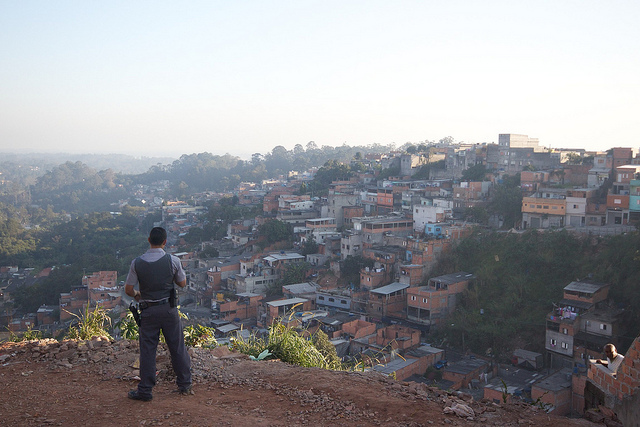As revelations surrounding the United States’ NSA surveillance programs continue to emerge, other governments and private citizens alike have raised their voices in opposition to this infringement on the privacy of Internet users’ personal data.
Latin American countries have had a particularly strong response, which intensified after leaked reports indicated that the NSA had targeted “commercial secrets” of Latin American allies and tapped multiple telecommunications networks in Brazil [pt]. In a statement released at the 2013 summit of Mercosur, the economic cooperative organization chastised the behavior of the United States’ government, stating “[we] emphatically reject the interception of telecommunications and espionage activities in our countries, as they are a violation of human rights, the right to privacy and the right to information of our citizens…”
Civil society advocates in Latin America responded to this call with an open letter reminding MERCOSUR countries and allies of their own commitments to citizens. The letter urged for a collaborative policymaking process in the region.
We want Latin America to become the model both of laws and practices allowing and enabling us to exercise our human rights to the maximum degree. The espionage problem we are facing right now is…an opportunity for us. Working together, governments and civil society, we can design a regional policy allowing us to develop in full all the potential of new technologies while protecting our citizens.
Indeed, while many eyes are currently fixed on the surveillance activities of the United States, citizens across Latin America are also at risk of abuses by their own national governments. Programs in Colombia, Mexico and Panama provide just a few examples.
Colombia, reportedly a critical target of US government spying, due to both the country's economic partnership with the US and drug-related security problems, has ramped up electronic surveillance efforts in recent years. In 2012, the federal government issued a decree mandating that telecommunication providers build backdoors into their systems to make it easier for law enforcement to spy on Colombians. The decree also required that Internet service providers collect the online location information of all of their subscribers and store that information for five years in order to aid law enforcement investigations.
In 2009, it was revealed that the Colombian government had for years illegally surveilled human rights groups, prominent journalists, political candidates, justices of the Supreme Court, clergy members, and other citizens. Colombia's intelligence service (Departamento Administrativo de Seguridad, or DAS), which reports directly to the president, not only spied on these individuals, but spied on their families, “taking photos of their children, investigating where they went to school, and tapping the phones of their parents, siblings and children.” Even after the program was exposed the abuses continued — evidence later proved that prosecutors investigating the DAS were even put under close watch.
More recently, the Colombian government has developed a program called Single Platform Monitoring and Analysis (Plataforma Única de Monitoreo y Análisis, or PUMA). Scheduled to launch in 2014, this new PRISM-like program would assist law enforcement in monitoring a wide variety of communications including online communications and social media networks. Through the PUMA program, the Colombian government aims to collect 20,00 different types of telecommunications media using 700 workstations for analysts to review collected data.
In Mexico, the federal government almost unanimously passed a law in 2012 granting police access to real-time user location data without a warrant. This law allowed local police to track the whereabouts and movements of nearly any cell phone user in country. In June 2013 it was discovered that the Mexican government had possibly been using a malicious software program known as FinFisher which has the ability to record the screen, keystrokes, camera, and microphone of infected computers. The escalation of drug-related violence in Mexico over the past seven years has been the impetus for many of these programs. But many believe that policymakers have failed to balance the legitimate, pressing need to protect citizens from drug violence with fundamental rights to privacy and due process of law.
In 2010, leaked US diplomatic cables revealed that Panama was working with the United States to run a wiretapping facility known as ‘Matador‘. Since that time, University of Toronto research center Citizen Lab has reported that FinFisher has also been found within Panama though the extent of its use it still unknown.
At least four Latin American countries have received significant assistance in setting up their surveillance programs from the United States, including the three countries discussed above as well as Paraguay.
These activities and instances of Latin American governments surveilling the online activities of their citizens do not make the vast global dragnet of the NSA any less scary. But they do illustrate how citizens across Latin America must be conscientious of surveillance by both foreign governments as well as their own.





5 comments
How come the most blatant trespassers of their citizens privacy and rights are not even METIONED. The Venezuelan bolibanana government – If you can call it that – routinely broadcasts on national radio and TV illegal recordings, emails and other personal information of their political opponents. Why are international nongovs blind to this? Marvelous free Cuba is NEVER mentioned.
Frankly your behavior undermines your posture and stature.
yours,
Jose A. Ramirez
Thank you for your comment. Indeed, you’re right. Both of these countries have surveillance regimes that heavily undermine the civil liberties of their citizens. We’ve reported on violations of privacy and free expression rights in these countries many times. In Cuba, surveillance is assumed and expected — citizens themselves are asked to watch and report on one another.
With this post, Greg wanted to highlight countries that are less commonly thought of as employing invasive surveillance practices. In the end, the objective was to complicate the picture — the US government is undermining citizens’ rights (not to mention national sovereignty) by spying on Internet users worldwide. But unfortunately, those users also have their own governments’ surveillance to contend with. Not a pretty picture.